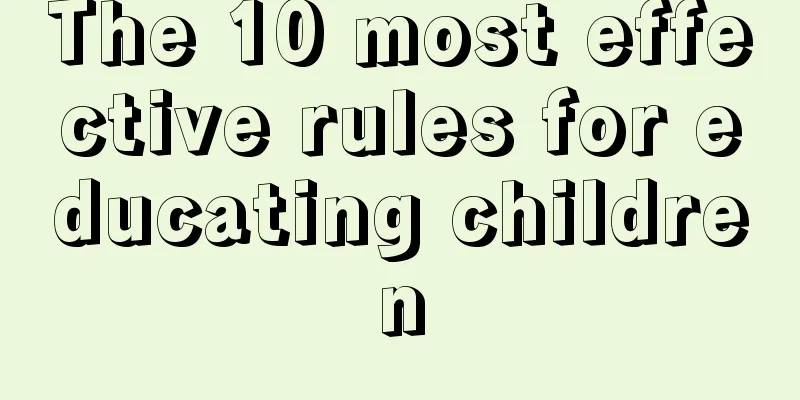The 10 most effective rules for educating children

|
First Rule Establish results - direction is more important than efficiency Outcomes are specific intentions that a family wants to achieve. A family without a clear end goal is like a headless fly. The outcomes should be consistent with the family’s mission. Goals, objectives, policies, all these words express the idea of changing the situation - starting from the somewhat unsatisfactory status quo and improving it to the results that people ultimately want. This plays an important role in parent education. If we do not determine the final results in the early stages of our family education, there will be no clear direction and the efficiency will often be very low. Second Rule Jianfeng Focus - The Way to Concentrate Capabilities Family education should pay great attention to the concept of focus. When a team works together, they have the power to change the world. The same is true in family education. Only when our family can work together in unity and strive hard can we achieve the same success as the successful families around us. We found that when cheetahs, tigers, lions... attack prey, facing groups of prey, they must choose a target and concentrate on chasing it in order to succeed. Otherwise, they will keep changing targets and will inevitably get nothing. The Third Rule Win-win rule: you are good, I am good, everyone is good Efficient family education must emphasize "overall balance", that is, the "win-win-win" concept. It is a word in ecology and environmental adaptation, meaning balance and equilibrium. In family education management, only when the internal and external aspects are balanced can we ensure the stable development of the family. If we maintain the concept of "three wins" in doing anything, we will be successful in everything we do. It can not only balance our inner and outer selves and make our body and mind consistent, but also gather resources, concentrate our capabilities and achieve sustainable development. The Fourth Rule Results-oriented - results are more important than reason In the process of implementing family education management, many parents only emphasize that the approach is reasonable or correct without considering whether it is effective or not. In fact, this is a misunderstanding in family education. The fundamental approach to balance a team is to establish a win-win-win principle (you are good, I am good, and everyone is good), which can better bring out the wisdom of the team. Taking "effect" as the guide and using neuro-linguistic management techniques as the tool, we will ultimately achieve the maximum value of family education and family teams. The Fifth Rule Prioritization - Do golden things in golden time Work performance = work results + work quality + time efficiency + cost control It can be seen that the ability of time management accounts for at least 1/4 of work performance! When Caesar the Great of the Roman Empire led his troops to war, no matter how tired he was, he would always think about how to use his time that day before going to bed every day. Only when time management is done well can we talk about other management. When talking about family education or learning, many of our parents always say that they don’t have time or not enough time. Has each of us parents really made serious time planning? The Sixth Rule Simplicity is golden - say "no" to "perfectionists"! The experience of life tells us that in our work and life, the most difficult problems often have the simplest solutions. Breaking down complex management science into simple common sense can make our work and life simple and orderly. The same is true for parents in the process of education. It is important to turn complex principles into simple and feasible actions. The Seventh Rule Mental resources - intangible assets are more important than tangible assets A pine seed contains all the potential to become a pine tree, but to become a pine tree, it also needs nutrients, water and light, and the tree's nature is already all within it. Mental resources belong to those mental behaviors that are "effective but the reasons cannot be explained yet." In fact, each of our children has the same resources and they all have huge potential, but the nutrients and environment we provide are different. The Eighth Rule The highest virtue is like water - as flexible as water The reason why reeds can survive strong winds is that they can bend down, but the elm tree wants to keep its back straight and as a result it is easily broken when strong winds blow. Neuro-grammar programming always emphasizes that in any system, the most flexible part is the part that can most influence the overall situation. The specific explanation is: having choices means having ability, so the most flexible people are the most capable people. In a group, stubbornness makes people nervous, while flexibility makes people relaxed. In the process of educating their children, parents must abandon their old ideas and find more possibilities to achieve a qualitative breakthrough. The Ninth Rule Enjoy the present moment——Happiness is productivity The family education theory of the trap: Everyone already has the resources to make themselves successful and happy. The qualities of success can be found in almost everyone, but we just don't use these "resources of success and happiness" well. From childhood to adulthood, each of us has had successful and happy experiences, which means that we all have the ability to make ourselves successful and happy. Believing that you have the ability or that everything is possible is the most effective guarantee of your success and happiness. Happiness is productivity. A family full of happiness is a family that can win battles. The Tenth Rule Leverage execution - guidance is more important than execution Give me a fulcrum and I can pry the earth up. ——Archimedes' lever principle The premise of family education is to bring about the best possible changes in your life and work, which is mainly reflected in motivation rather than the results of other people's actions. An excellent manager should be a "mentor" who pays close attention to the execution process and provides practical guidance on execution methods. "Execution ability" cannot be separated from the support of "guidance ability". At the same time, "guidance" is the manager's "execution"! |
<<: 3 tips to teach your children to read happily
>>: The top 6 behaviors that children dislike their parents
Recommend
What are the methods for children to skip rope
Jumping rope has always been a very healthy way o...
What to do if the baby's umbilical cord is around the neck
After a woman becomes pregnant, the umbilical cor...
What should my child eat if he has a stomachache and vomits?
Stomachache is a common symptom in life. Many chi...
What is the reason for the child's
Children are weak, their immune systems are not a...
The child fell and got a bump on the back of his head. Should I apply cold or hot compress?
We all know that children are prone to falling wh...
Baby walks unsteadily and legs are weak
Learning to walk is an indispensable stage in a b...
What to do if your child has stomachache
The stomach is an important digestive and absorpt...
Causes and treatment of vomiting and fever in children
Having a baby will make every family happy, but h...
What calcium supplements should children take to grow taller?
We all know that calcium supplementation helps ch...
What can children eat to supplement calcium and grow taller?
When children reach the stage of development, the...
Can babies drink water boiled with loquat leaves?
Drinking loquat leaves boiled in water is very ef...
What is the most nutritious food for children?
Every parent attaches great importance to the nut...
Treatment of lymph nodes on children's neck
It is very serious if a child has lymph nodes on ...
What are the symptoms of calcium deficiency in five-month-old babies?
Babies may have various problems during their gro...
Causes of bad breath in babies in the morning
Many babies have bad breath when they wake up in ...









